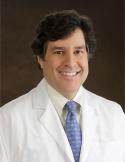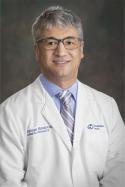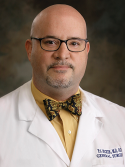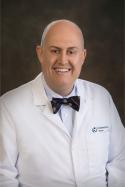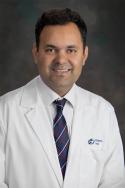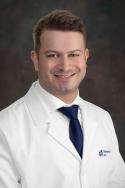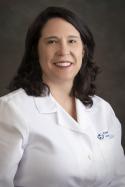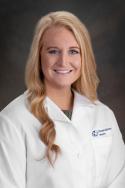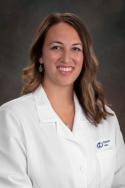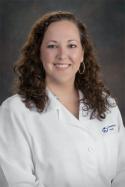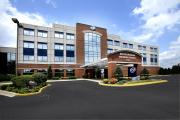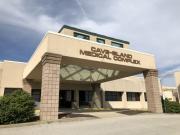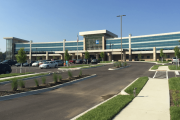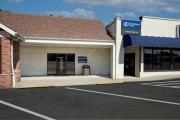Esophageal Cancer
When you’re diagnosed with cancer of the esophagus, you need expert care and a team that’s ready to help you navigate treatment. We’ll work collaboratively with you, and with one another, to support you through every twist and turn—developing a treatment plan that’s personalized to your unique diagnosis, needs and treatment goals.
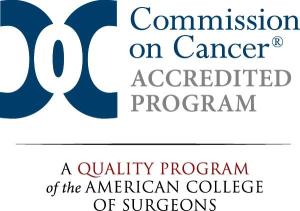
As an accredited Comprehensive Community Cancer Program, we offer nearly all the same options and technology you’d find at an academic medical center, just close to home. And you can count on our caring clinicians to treat your cancer holistically, caring not just for your physical health, but your mental and emotional health, too.
What is Esophageal Cancer?
Esophageal cancer develops in the hollow, muscular tube in the chest that connects the throat to the stomach, and often affects your ability to eat and swallow. Usually starting in the mucosa, which is the esophageal wall layer that lines the inside of the esophagus, esophageal cancer typically spreads outward through the outer layers of the esophageal wall as it grows.
Esophageal Cancer Risk Factors
A risk factor is something that increases your risk for developing a certain type of cancer. Some risk factors, like those related to genetics, you can’t change. But others, like risk factors related to lifestyle, you can.
Esophageal cancer has several key risk factors linked to lifestyle, including:
- Tobacco use. Using tobacco products is a major risk factor for this type of cancer. Your risk increases with how often you use tobacco and for how long you use it.
- Alcohol use. Drinking alcohol also increases your risk of developing esophageal cancer. Like tobacco, risk increases with how much you drink and how often.
Other risk factors for esophageal cancer include:
- Age, with risk increasing as you get older.
- Certain infections, like human papillomavirus (HPV).
- A diet high in processed meats
- Gender, with more men than women developing the disease.
- Having certain conditions, like gastroesophageal reflux disease (GERD), Barrett’s esophagus, achalasia, tylosis or Plummer-Vinson syndrome.
- History of other cancers, such as lung, mouth and throat cancer.
- Injury to the esophagus, such as by accidentally drinking a lye-based cleaner.
- Obesity
Esophageal Cancer Symptoms
Most esophageal cancers don’t cause symptoms until they’ve advanced, making them harder to treat. Still, the most frequent symptom—and what most frequently leads to an esophageal cancer diagnosis—is trouble swallowing.
Trouble swallowing, also known as dysphagia, may feel like food is stuck or caught in the throat. Often, this symptom begins as mild and worsens over time.
Other esophageal cancer symptoms may include:
- Chest pain
- Chronic cough
- Hoarseness
- Vomiting
- Weight loss
Esophageal Cancer Types
Esophageal cancer is classified based on the type of cell where it starts. There are two main types:
- Adenocarcinoma, which develops when gland (or mucus-making) cells grow out of control. These typically develop in the lower part of the esophagus.
- Gastroesophageal (GE) junction tumors are adenocarcinomas that develop where the esophagus meets the stomach (the GE junction). These tumors behave and are treated like esophageal cancers.
- Squamous cell carcinoma, which develops when squamous cells in the inner layer of the mucosa grow out of control. Most commonly, it begins in the part of the esophagus that’s in the neck or the top of the chest.
Other types of cancer that start in the esophagus are rare. These include lymphomas, melanomas and sarcomas.
Diagnosing esophageal cancer
Most of the time, esophageal cancer is discovered when someone begins having trouble swallowing or by accident during other medical tests.
If we suspect esophageal cancer, we’ll typically review your medical history and conduct a physical exam. We’ll also perform tests, such as:
- Blood tests
- Imaging tests, including:
- Barium swallow, which can show abnormal areas in the normally smooth lining of the esophagus and may be used to find even small, early cancers.
- CT scan, including a CT-guided needle biopsy, which can help determine if cancer has spread to nearby organs and lymph nodes.
- MRI, which can be used to look for possible cancer that has spread to the brain and spinal cord.
- PET/CT scan, which can be helpful with diagnosis and to determine where cancer has spread.
- Endoscopy, which uses a narrow, flexible tube with a tiny video camera and light to look for signs of cancer. Types of endoscopies we may use include:
- Bronchoscopy to see if cancer has spread to the trachea or bronchi.
- Endoscopic ultrasound to determine a tumor’s size and how far it might have grown into nearby tissue.
- Thoracoscopy and laparoscopy to see lymph nodes and other organs near the esophagus inside the chest (by thoracoscopy) or abdomen (by laparoscopy).
- Upper endoscopy, which takes tissue samples from any abnormal areas of the esophageal lining. This also may be used to help enlarge the opening of the esophagus to let food and liquid pass.
- Lab tests
Treating esophageal cancer
An esophageal cancer diagnosis requires expert care from a multidisciplinary team. That’s why your care team may include a variety of specialists, from medical, radiation and surgical oncologists to gastroenterologists and cardiothoracic surgeons. It also may include supportive care clinicians, such as dietitians, genetic counselors and nurse practitioners.
Treatment for esophageal cancer typically depends on whether it’s spread. To treat esophageal cancer, we may recommend:
- Chemotherapy. We don’t typically recommend chemotherapy by itself to treat esophageal cancer. We will often prescribe it with radiation therapy, though. We also may use it to help shrink tumors and relieve symptoms.
- Radiation therapy. This treatment is often combined with other therapies, like chemotherapy, to treat esophageal cancer. It also may be used before or after surgery—either to shrink the cancer to make it easier to remove or to kill any leftover cancer cells.
- Surgery: Cancers that haven’t spread may respond to surgery, either alone or in combination with other treatments, such as chemotherapy and/or radiation therapy. Surgery to remove the esophagus and nearby lymph nodes to get rid of cancer is called an esophagectomy.
We also may use surgery to relieve some of the symptoms caused by the cancer. - Targeted therapy and immunotherapy: In some cases, we may recommend targeted therapy or immunotherapy drugs to treat esophageal cancer. For example, we may test a biopsy sample for the presence of proteins like HER2 and PD-L1 that may respond to certain drugs.
